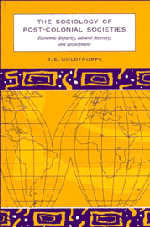Book contents
- Frontmatter
- Contents
- Preface and acknowledgements
- 1 Introduction and argument
- 2 Technology, society, and population
- 3 The colonial episode and the race question
- 4 Economic conditions
- 5 Environmental concerns
- 6 The social sciences and the ‘Third World’
- 7 The rise of towns
- 8 Family life in a changing world: two studies
- 9 Cultural diversity, language, education, and communications
- 10 Religion and development
- 11 Individual modernization: some psychological studies
- 12 Politics in post-colonial states
- 13 Aid and development
- Notes
- Index
4 - Economic conditions
Published online by Cambridge University Press: 03 May 2011
- Frontmatter
- Contents
- Preface and acknowledgements
- 1 Introduction and argument
- 2 Technology, society, and population
- 3 The colonial episode and the race question
- 4 Economic conditions
- 5 Environmental concerns
- 6 The social sciences and the ‘Third World’
- 7 The rise of towns
- 8 Family life in a changing world: two studies
- 9 Cultural diversity, language, education, and communications
- 10 Religion and development
- 11 Individual modernization: some psychological studies
- 12 Politics in post-colonial states
- 13 Aid and development
- Notes
- Index
Summary
Measuring disparity and development
The GNP measure
The most obvious way of starting to investigate the differences between rich and poor countries, or individuals, is to compare their incomes. As I explain below, there are certain pitfalls in this approach to the differences between rich and poor countries, but up to a point it is a good and useful one.
There are three possible measures of a country's collective income, and of these the one most commonly used is the gross national product or GNP. The gross domestic product or GDP is the value of all goods and services produced in the country, usually valued ‘at factor cost’, that is, adjusting for indirect taxes and subsidies. Gross national product is the gross domestic product at factor cost, plus any balance of income received from abroad. National income is gross national product net of depreciation. It represents the resources available for current use after setting aside sufficient to maintain the nation's stock of capital equipment, and is the best measure accordingly; however, it is more difficult to calculate, since it is hard to arrive at estimates, or even a satisfactory definition, of depreciation; and it is not available for as many countries as is GNP.
Most countries have statistical departments which calculate and publish an annual estimate of the GNP in the national currency. This can be converted into a standard currency (by convention US dollars) at an appropriate rate (usually the official rate of exchange).
- Type
- Chapter
- Information
- The Sociology of Post-Colonial SocietiesEconomic Disparity, Cultural Diversity and Development, pp. 72 - 98Publisher: Cambridge University PressPrint publication year: 1996



